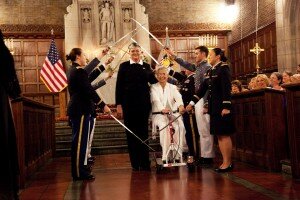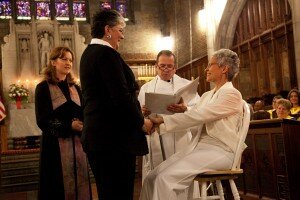First Gay Weddings Held at West Point

By David Small

West Point (Nov. 24, 2012) Army 1st Lt. Ellen Schick married Shannon Simpson in an intimate ceremony here at the Old Cadet Chapel in the first LGBT wedding at West Point since the repeal of “Don’t Ask, Don’t Tell.”
WEST POINT, N.Y. (Dec. 1, 2012) —While the rest of the country awaits a decision by the Supreme Court on which Defense of Marriage Act (DOMA) case it will hear, West Point was atwitter with love today, having hosted its second lesbian couple to legally marry on the hallowed military grounds within a week—the first same-sex weddings at the U.S. Military Academy since New York legalized same-sex marriage last year.
Brenda S. “Sue” Fulton wed her partner of 17 years, Penelope Dara Gnesin, in the Academy’s cathedral-like Cadet Chapel during a traditional ceremony Dec. 1.
Nov. 24, after three years together, Army 1st Lt Ellen Schick, who works at Keller Army Community Hospital at West Point, married Shannon Simpson in an intimate ceremony with a handful of close friends and relatives at West Point’s older, original cadet chapel, built in 1836. The two Pennsylvania natives were unaware of their status as the first gay couple to marry at West Point until they connected with Sue.
“Ellen is very proud to serve her country and wanted a Military wedding,” Shannon told OutServe Magazine. “We felt that we should be allowed the same opportunity to marry on a military post as any heterosexual military couple.”
For the Fulton-Gneslin wedding, the significance of the location dates back further.
“West Point holds special significance to both me and Penny,” said Sue, a 1980 graduate and presidential appointee to its Board of Visitors. “From the time I was a cadet, what West Point stands for – integrity, leadership, selfless service – have been my touchstones. When Penny and I worked on ending ‘Don’t Ask, Don’t Tell,’ we kept coming back to the core value of integrity, and that’s what made a difference. To be able to legalize our union here, especially at the Cadet Chapel, is really important to us.”

West Point (Dec. 1, 2012) Sue Fulton and Penny Gneslin, the first LGBT couple to marry in the U.S. Military Academy Cadet Chapel go through the saber arch provided by members of OutServe, Knights Out, USMA’s Spectrum, and one straight ally. Four Army lieutenants and four West Point Cadets formed the arch. Photos by Jeff Sheng
Photos by Jeff Sheng
The two pioneers in LGBT military rights had planned to marry in their home state of New Jersey when their state assembly passed a marriage equality bill, however, Gov. Chris Christie vetoed the measure, forcing the couple to rethink plans.
“I just didn’t want to wait any longer,” said Sue, who proposed over the summer. The couple had held a commitment ceremony in 1999, though it held no legal significance. “I still hope that our home state will recognize marriage equality, but Penny—as strong as she is—is a breast cancer survivor, and has been dealing with Multiple Sclerosis for more than ten years. We cannot wait for a governor who thinks everyone should get to vote on whether, after 17 years together, we are really married.”
Despite Penny’s health challenges, Sue says it doesn’t affect their relationship.
“Many people see Penny and focus on her disability, but I don’t see it anymore,” said Sue. “Instead, I just delight in the cockeyed way she sees life. What’s important to us is laughter. I am a very mercurial person; Penny’s spirituality and unique view of the world always bring me back to center.”
Their service was mostly traditional, though Penny’s Jewish heritage was reflected by sounding the Shofar, a symbolic call to gather people for a momentous occasion.
Walking down the aisle together, following their two attendants, they had two friends help Penny from her trusty scooter onto the raised nave and into a chair for the balance of the service.
Tears were seen on many cheeks as each answered the question, “Will you have this woman to be your spouse…” Each vowed to one another, “No matter what may come, I pledge to stand by you. I promise to respect your unique talents and abilities, and your journey. I promise to be true to you, and to my own path. Now we stand together; may it always be so.”
Heard often at weddings, and cited here was the Book of Ruth, “Wherever you go I will go, and wherever you stay I will stay…” Overlooked by many, however, is the fact this phrase was said by Ruth as she clung tightly to another woman, Naomi—making the phrase all the more special for a marriage between two women.
Music being a focal point in their lives, Sue and Penny entertained onlookers by joining the chorus, Giving Voice, during their ceremony. Sue took the solo, and Penny, who directs two women’s choruses, directed the song “Welcome Table.” Hijacking the chorus, not unsurprising for the mischievous pair, was a nod to how they met in 1995 during a community sing. Seventeen years ago, Penny, director of a local community chorus, attended a local event with singer-songwriter Carolyn McDade. While most of the participants sang melody, Sue’s contralto harmony caught Penny’s ear and ultimately brought the two to meet. Penny was in charge of selecting all organ music for the wedding, filling the church from one of the largest pipe organs in the world.
While their God-daughter served as the ring bearer, Unitarian Universalist Minister Vanessa Southern, their home church’s pastor, co-officiated with Episcopalian Chaplain (Col.) J. Wesley Smith, the senior Army chaplain at Dover Air Force Base, Delaware. Smith oversees the dignified return of Soldiers killed in action to the military mortuary there.
The wedding ceremony included the customary military tribute of an arch of sabers through which the couple passed, smiles on their faces. The image of walking out of her wedding through arched swords at the Cadet Chapel was something Cadet Fulton had dreamed of 35 years previous. Four Army lieutenants and four West Point cadets made up the arch, straight and LGBT members of Spectrum, Knights Out, and OutServe-SLDN. The Schick-Simpson wedding also included the traditional saber arch.
At the reception, held at the historic Thayer Hotel, Sue jokingly thanked Penny “for giving (her) one more chance… to be the center of attention,” and directed the focus briefly on the LGBT movement’s marriage equality agenda.
“Everyone here, directly or indirectly, has been part of this movement, to acknowledge the full humanity of gay, lesbian, bi, trans, and queer people. I’m honored, because you know that the movement is about this. It’s about love. It was always about love.”
Despite now being legally wed, the two face difficulties that their straight, married counterparts do not have to endure.
“We’re selling a house right now, which will have tax implications to us even though we both own it—we are not viewed as married in the eyes of the law,” said Sue. Although she is fortunate to work for a pharmaceutical company which offers benefits for same-sex partners, those benefits are taxable while the same benefits for married couples are not.
“We’re always conscious that if the worst happens, we aren’t married in the eyes of the government. We have taken the extra measures necessary to protect ourselves legally,” said Sue. “But even then there will be an extra tax liability. We’re lucky compared to the Soldiers we serve, because we’ve had time and the means to protect ourselves. People like [Army Warrant Officer] Charlie Morgan are relying on the military to protect their families when they die, and that protection isn’t there.”
Morgan, a member of the New Hampshire National Guard, is dealing with end-stage cancer. She and her wife are plaintiffs in a lawsuit against DOMA.
Sue, 53, works at a pharmaceutical company in New Jersey, and is a presidentially-appointed member of the Board of Visitors of the U.S. Military Academy at West Point. She serves as Board member of OutServe-SLDN, an organization supporting lesbian, gay, transgender, and bisexual military service members and veterans. She graduated from West Point in the first class to include women, and was honorably discharged from the Army at the rank of captain.
She is the daughter of Benjamin D. and Clara Bevis Fulton of Lakeland, FL. Her father, a Navy veteran, was a teacher at Martin County High School. Her mother, who is also retired, was the first female principal at Martin County High School.
Penny, 52, is a holistic healer and director of the women’s choir, Giving Voice. She graduated from Rutgers University and is medically retired from AT&T.
She is a daughter of Oscar and Sylvia Katz Gnesin of Long Branch, N.J., both deceased. Her mother was a history teacher and an attorney for the local teachers’ union. Her father worked as an electrical engineer for the U.S. government.
Giving Voice, a women’s a cappella chorus, was founded by Penny 18 months ago, and is based at the Universal Unitarian Congregation of Monmouth County, Lincroft, N.J. Giving Voice was joined by three members of Olympia’s Daughters, founded and directed by Penny from 1989 to 2009.
The couple is postponing their honeymoon until next year.






